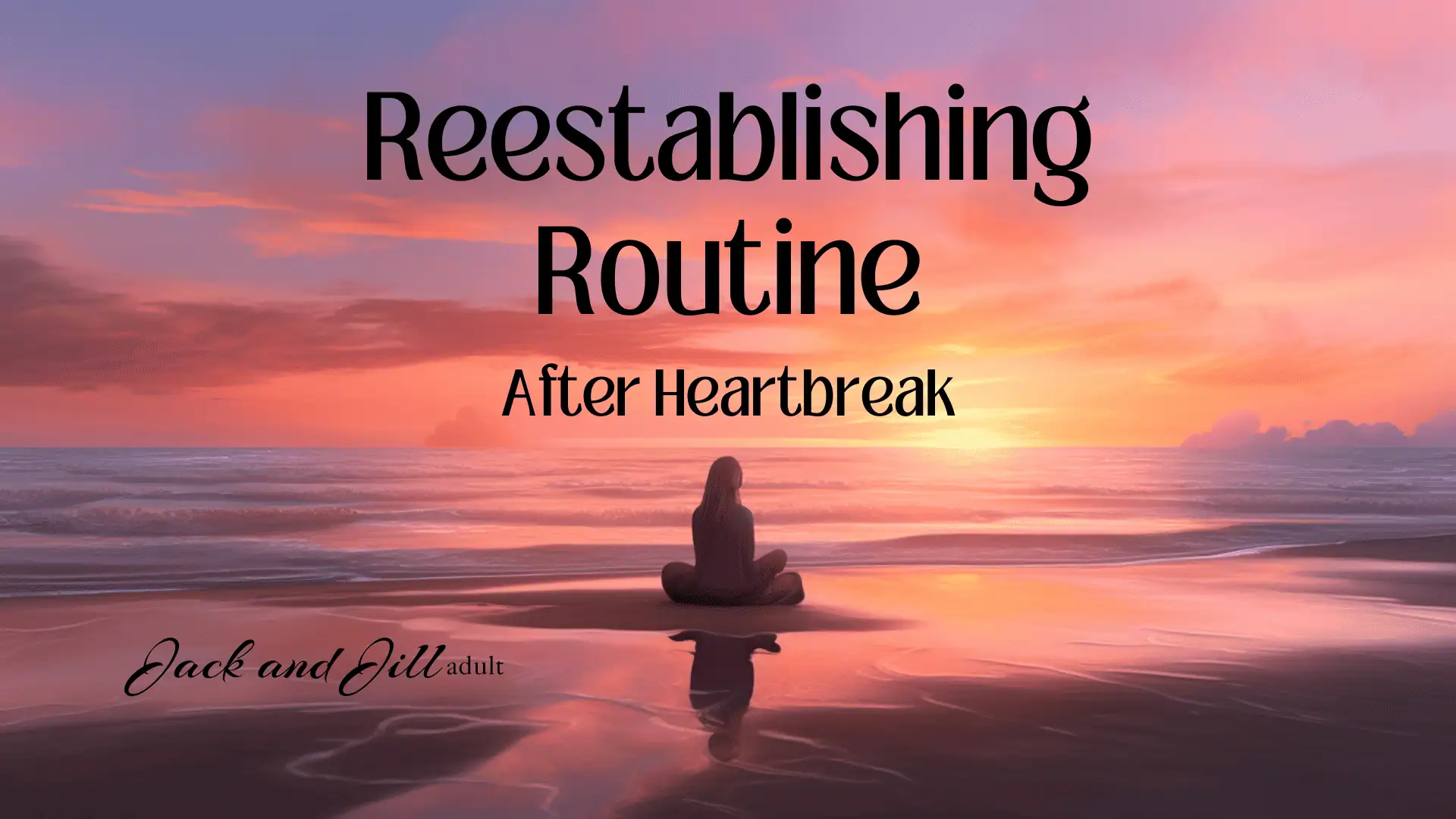
Reestablishing Routine After Heartbreak
Heartbreak is an unavoidable aspect of romantic relationships. When a break-up occurs, it often feels like your world has been turned upside down, and the pain can be overwhelming. But with a conscious effort and a supportive network, Reestablishing Routine After Heartbreak and embarking on a journey of self-improvement and self-growth. This blog aims to guide you through the healing process, offering advice on navigating your new reality and finding joy in life.

The Initial Shock: Embracing the Painful Emotions
When a relationship ends, the immediate aftermath is filled with intense, painful emotions. You might feel a broken heart, a sense of loss, and an overwhelming sadness. These feelings are normal and are part of the grieving process. It’s crucial to let your emotions flow and not suppress them. Talking to friends and family about your feelings can provide immense relief. Sharing your grief with loved ones with similar experiences can offer comfort and remind you that you’re not alone.
Building a Breakup Support Network
Building a solid breakup support network is one of the most critical steps in reestablishing routine after heartbreak. Friends and family play a crucial role in your healing process. Close friends and old friends can provide a sense of stability and remind you of your self-worth. Reaching out and leaning on your support system during this difficult time is essential. They can offer advice, listen to you talk about your ex-partner, and help you cope with the painful emotions of a break-up.

Self-Care and Self-Compassion
Taking care of your emotional wellbeing is essential. Practicing self-care and self-compassion can help you navigate the painful emotions and stress hormones that come with heartbreak. Simple acts of self-care, such as taking a long bath, eating your favorite food, or engaging in activities you enjoy, can provide comfort and a sense of normalcy. Remember to be kind to yourself and acknowledge that healing is a process that takes time and conscious effort.
Establishing New Routines
One of the best ways to reestablish routine after heartbreak is to create new routines. These new routines can provide structure and a sense of purpose. Whether starting a new hobby, setting new goals, or developing new skills, these activities can help you focus on your needs and personal growth. Exercise is another excellent way to release stress hormones and improve your mood. Regular physical activity can boost your emotional wellbeing and provide a healthy outlet for your emotions.
Embracing a New Beginning
Heartbreak often signals the end of one chapter and the beginning of another. Embracing this new beginning can be both daunting and exciting. It’s an opportunity to rediscover yourself and your interests. This is the time to focus on self-improvement and self-growth. Consider what you want to achieve and how to achieve these new goals. Reflect on your past relationship and use the insights gained to foster healthier relationships in the future.

Coping with Painful Emotions
It’s essential to accept that healing from heartbreak involves coping with a range of painful emotions. Anger, sadness, and longing are all part of the healing process. Allow yourself to feel these emotions and understand that they are temporary. Talking about your feelings with close friends or a therapist can be incredibly beneficial. They can provide a different perspective and help you healthily process your emotions.
Finding Joy and New Opportunities
As you progress through the healing process, you’ll begin to find joy in life again. Look for new opportunities to bring happiness into your life. This could be trying new hobbies, spending time with loved ones, or making new friends. Pop songs and other forms of entertainment that resonate with your experience can also be surprisingly therapeutic. These activities can provide a sense of normalcy and remind you that there is joy on the other side of heartbreak.
The Importance of Self-Worth
Reestablishing routine after heartbreak involves rebuilding your sense of self-worth. It’s easy to question your value after a break-up, but it’s crucial to remember that your past relationship does not define your worth. Focus on your strengths and achievements, and celebrate the small victories. Engaging in self-improvement activities and setting new goals can help boost your confidence, self esteem, and remind you of your worth.
Moving Forward
Moving forward after heartbreak means accepting your new reality. This acceptance is not about forgetting your past relationship but acknowledging that life continues. It’s about finding a balance between honoring the past and embracing the future. This new reality may involve changes in your daily routine, social circle, and outlook. Embrace these changes as part of your journey towards healing and personal growth.

The Role of Close Friends and Family
Your close friends and family play a significant role in your healing process. They can offer a listening ear, a shoulder to cry on, and practical support as you navigate your new reality. Don’t hesitate to lean on them and communicate your needs. Their support can stabilize and remind you that you are loved and valued.
Developing New Skills and Interests
One of the most rewarding aspects of reestablishing routine after heartbreak is the opportunity to develop new skills and interests. Whether learning a new language, picking up a musical instrument, or taking up a new sport, these activities can provide a sense of accomplishment and joy. They can also help you meet new people and expand your social circle, further enriching your life.
Focusing on Your Own Needs
After a break-up, it’s essential to focus on your needs. This means prioritizing your emotional wellbeing and making time for activities that bring you joy. It’s about balancing caring for yourself and being there for others. Remember that it’s okay to put yourself first and take the time you need to heal.
Embracing Self-Improvement and Self-Growth
Heartbreak can be a catalyst for self-improvement and self-growth. Use this time to reflect on what you’ve learned from your past relationship and how to apply these lessons to your future. Consider what areas of your life you want to improve and set achievable goals. This could involve pursuing further education, developing new skills, or positively changing your lifestyle.

The Healing Process: A Journey
Healing from heartbreak is a journey that requires time, patience, and conscious effort. It’s about allowing yourself to grieve, finding healthy ways to cope with your emotions, and gradually moving forward. Remember, there is no set timeline for healing; taking things at your own pace is okay. Be patient with yourself and acknowledge your progress, no matter how small.
The Importance of Talking About Your Feelings
Talking about your feelings is an essential part of the healing process. Whether it’s with friends, family, or a therapist, expressing your emotions can provide relief and help you process your grief. It can also offer new insights and perspectives you might not have considered. Don’t be afraid to reach out and share your feelings with those who care about you.
Accepting the Past and Embracing the Future
Part of healing from heartbreak involves accepting your past relationship and the emotions that come with it. This acceptance is not about forgetting but acknowledging and learning from what has happened. Embrace the future with an open heart and a sense of hope.
Look forward to the new opportunities and experiences that await you.
The Role of Exercise and Physical Activity
Exercise and physical activity play a significant role in managing the stress hormones associated with heartbreak. Regular exercise can improve your mood, boost your energy levels, and provide a healthy outlet for your emotions. Physical activity can be incredibly therapeutic, Whether for a run, joining a fitness class, or simply walking in nature.

Finding New Routines and Hobbies
Creating new routines and hobbies is essential to reestablishing routine after heartbreak. These activities can provide a sense of purpose and structure, helping you navigate your new reality. Consider what interests you and what activities bring you joy. Whether painting, gardening, or cooking, find something you enjoy and make it a regular part of your life.
Reconnecting with Old Friends and Making New Friends
Reconnecting with old friends and making new friends can provide a sense of community and support. These connections can remind you of your worth and offer new perspectives on life. Don’t be afraid to reach out and reconnect with people from your past or join new social groups. Building a solid social network can be incredibly beneficial for your emotional wellbeing.
Embracing Your New Reality
Embracing your new reality involves accepting the changes that come with heartbreak and finding ways to navigate them. It’s about creating a new sense of normalcy and finding joy daily. This new reality may involve new routines, hobbies, and friendships. Embrace these changes as part of your journey towards healing and personal growth.
Moving Forward

Moving forward after heartbreak requires hope and optimism. It’s about believing that things will improve and that there is joy on the other side of pain. Focus on your progress and the new opportunities that await you. Remember that heartbreak is not the end but a new beginning, a chance to rediscover yourself and find happiness in life again.
Summary
Reestablishing routine after heartbreak is a journey that requires time, effort, and support. By embracing your emotions, leaning on your support system, practicing self-care, and finding new routines, you can navigate your new reality and find joy in life once more. Remember that healing is a process, and taking things at your own pace is okay. With time and conscious effort, you will emerge more robust and resilient on the other side of heartbreak.
FAQ
Q: How can I start reestablishing my routine after a break-up?
A: Focus on small, manageable tasks. Establish new routines like regular exercise, pursuing a hobby, or spending time with supportive friends and family.
Q: What role do friends and family play in my healing process?
A: Friends and family provide emotional support, stability, and a sense of belonging. They offer advice, listen to your feelings, and help you cope with painful emotions.
Q: How can I manage the painful emotions following a break-up?
A: Allow yourself to feel and express your emotions. Talk to loved ones, journal, or seek professional help. Engage in self-care activities and healthy outlets like exercise or creative hobbies.
Q: Why are self-care and self-compassion important during this time?
A: Self-care and self-compassion help maintain your emotional wellbeing. They manage stress, provide comfort, and reinforce your self-worth. Treat yourself with kindness and prioritize joy and relaxation.
Q: What new routines can I establish to help with the healing process?
A: Start a new hobby, set personal goals, develop new skills, or incorporate regular physical activity into your routine for structure, purpose, and accomplishment.

